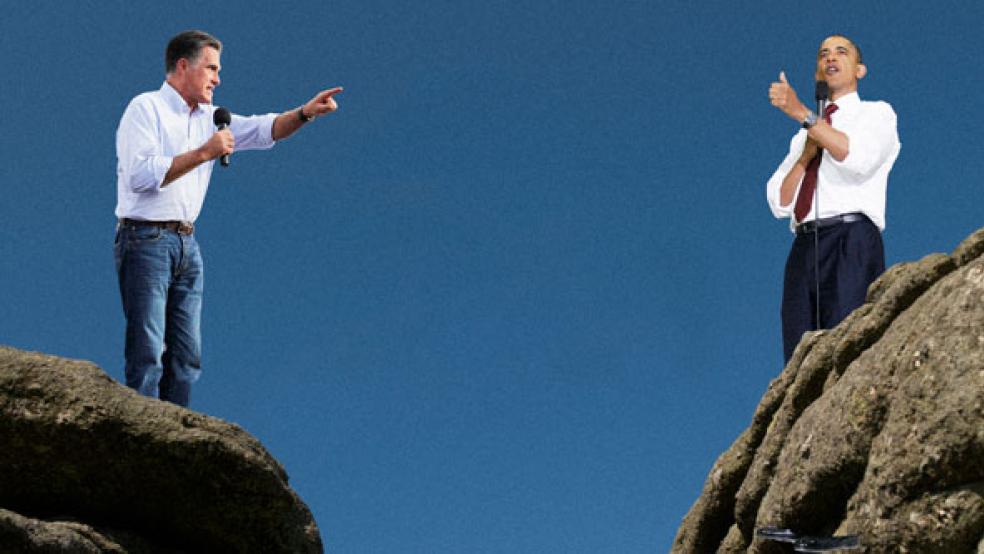By now, almost everyone knows that under current law a large “fiscal cliff” faces the economy on January 1, as a number of temporary tax cuts expire and automatic spending cuts take effect. The deficit would fall by about $550 billion next year if all these measures take effect, but both parties are reluctant to permit this to happen.

Neither party has precisely spelled out its objections to the fiscal cliff. Democrats seem concerned mainly about the rapidity of the deficit reduction because they ascribe to Keynesian economics, which says that the budget deficit is stimulative under economic conditions such as those we have now—low growth, inflation and interest rates; high unemployment and sluggish aggregate demand.
Therefore, reducing the deficit sharply before the economy returns to health will be depressing, economically. Democrats point to the economic stagnation in Europe, where deficit reduction has been implemented to a greater extent than here, and the example of 1937, when Franklin D. Roosevelt cut the deficit sharply and the economy immediately went into a tailspin.
Republicans claim to be enthusiastic about deficit reduction, but appear only willing to accomplish it by cutting domestic spending. They oppose cuts in defense spending for both economic and security reasons, not to mention the impact on defense contractors — whose political contributions overwhelmingly go to Republicans.
They are also strenuously opposed to any tax increase for any reason. Republicans have long said that the tax cuts of the George W. Bush administration should be made permanent—even though they themselves originally enacted them with expiration dates. However, they are open to letting the temporary cut in the payroll tax expire, since they don’t believe that tax cuts for working people have any stimulative effect; only tax cuts for the ultra-wealthy are stimulative according to Republican doctrine.
Therefore, the greatest Republican concern is that tax rates on the wealthy will increase. Under Bush, the top statutory income tax rate fell from 39.6 percent, where it was throughout the economic boom of the 1990s, to 35 percent in 2003. Even though there is no evidence whatsoever that this tax cut had any stimulative effect, Republicans dogmatically insist that tax rates on the wealthy should not only not be permitted to rise, but must be cut further.
Mitt Romney would cut the top rate to 28 percent along with a number of other tax cuts for the rich and for big corporations. Relative to current law, the Tax Policy Center estimates that a third of the benefits of the Romney tax cut would accrue to the top 1 percent of households, with half of that going just to the top 10 of the top 1 percent (0.1 percent).
He has repeatedly said that his tax cut would not raise the deficit because tax loopholes and shelters would be closed to recoup the revenue loss. However, Romney has steadfastly refused to name a single tax loophole he would get rid of.
Republicans are, of course, willing to take Romney on faith. Anyway, they don’t really care if a tax cut loses revenue because it will put downward pressure on spending—they all believe in something called “starve the beast,” which says that cutting taxes is the best way to force spending cuts. Spending cuts—except for defense—are stimulative in the Republican model because they reduce the burden of government, which is the principal drag on growth.
One problem for Republicans that they have not been forced to address yet is the extreme difficulty of finding sufficient tax loopholes to close to keep further tax cuts from blowing a hole in the deficit. They are content to allow people to assume that somehow or other it is someone else who will lose their cherished tax deduction, not them.
However, a new report from the Tax Policy Center throws cold water on that assumption. It shows that it is pretty much impossible to reduce income tax rates without scaling back or abolishing popular tax expenditures such as the mortgage interest deduction, the deduction for state and local taxes, the charitable contributions deduction or the exclusion for employer-provided health insurance.
Furthermore, the rich would save much more in taxes from a reduction in the top rate than they would lose from having all their tax deductions taken away. If a tax package is done in a revenue-neutral manner—neither raising nor lowering aggregate revenues—then more of the tax burden must necessarily fall on the poor and middle class as a simple matter of math.
Barack Obama has yet to announce any plans for tax reform or what, ultimately, to do about the expiring Bush tax cuts. He remains committed to allowing them to expire for those making more than $250,000 per year, but extended for everyone else—but only for one year. Next year, Obama would work with Congress on a permanent solution to the problem of continually expiring tax provisions that make it difficult for businesses or individuals to plan for the future.
A big danger in the Obama approach is that Republicans will simply stonewall, as they did in 2010, forcing him to accept full extension of all the Bush tax cuts or risk a big tax increase that might destabilize the economy. Obama’s strategy is to force the issue now, taking advantage of the fact that public opinion strongly supports allowing tax cuts for the rich to expire. He believes that whichever way the vote in Congress goes, he will benefit politically.
I am disinclined to think that Congress will resolve the problem of the fiscal cliff before the election. And I think the odds of it doing so after the election in a lame duck session are also long. More than likely, everyone will agree to kick the can down the road and agree to simply delay everything for a year while both sides try, yet again, to come to agreement on a long-term solution to our tax, budgetary, and economic problems.






